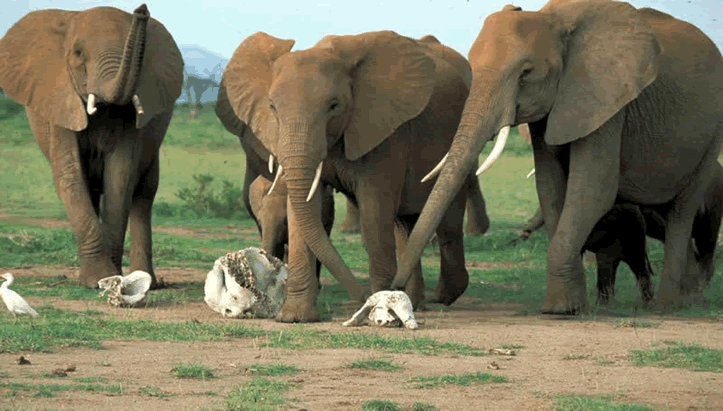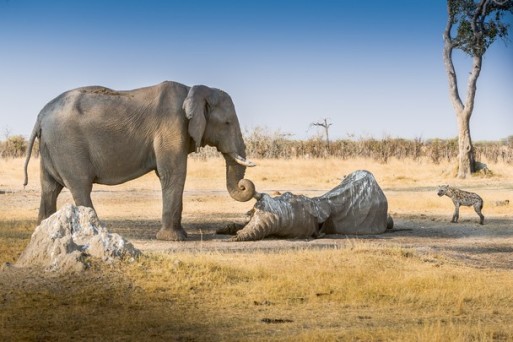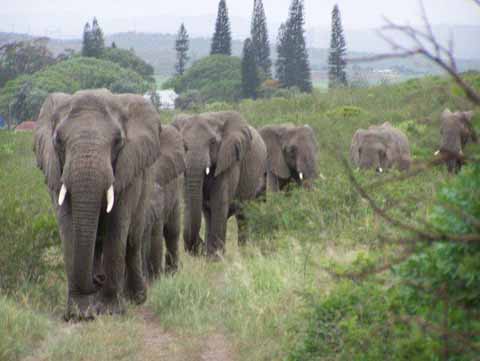Elephants are one of the most intelligent of all animals. Their brains contain over 300 billion neurons as well as a highly developed cerebral cortex that is similar in complexity to that of humans and larger than that of almost all other primates except the great apes. In the wild, they form complex social groups; communicate through an array of verbal and nonverbal “languages;” and form long-lasting social bonds that persist through separations of many years.
Scientists who have observed elephants’ behaviors when they encounter an elephant that has died also believe the creatures grasp the concept of death and feel emotions such as sorrow, grief and loss. Elephants have been observed mourning lost members of their social group — performing rituals that include touching and caressing the bones of the dead, moving them to different locations, and burying them with grass, leaves and tree limbs.

Elephants mourning
(Credit: scalar.usc.edu)
According to elephant researcher Martin Meredith, elephants will also vocalize in various ways as they grieve their dead — sometimes grumbling softly, sometimes making noises that sound almost like screams. Some even shed tears. It is not unusual for elephants to stand watch over the grave of a dead member of their tribe, often for days at a time.
Elephants also have been observed protecting the remains of one of their own from predators. John Chaney of National Geographic once observed a female elephant who encountered the body of a dead elephant that was besieged by jackals and vultures. The elephant chased the predators away, gently wrapped her trunk around the dead elephant’s tusks and stood there for several hours, guarding the body as she appeared to mourn the loss.

Elephant protecting a dead elephant from jackals
(Credit:lovenature.com)
Nor is elephant mourning short-lived. Unlike other animals, elephants appear to experience profound and long-lasting grief. Animal behavior expert Marc Bekoff describes an instance in which he and elephant conservationist Iain Douglas-Hamilton observed a herd of elephants whose matriarch had died. “Their heads were down, ears dropping, tails hanging listlessly, and they were just walking here and there, moping around, apparently brokenhearted,” he explains.

These African elephants traveled 12 hours to visit the home of Lawrence Anthony, the conservationist who saved their lives
(Credit: delighmakers.com)
Elephants have even been known to mourn human companions. After the sudden death of “The Elephant Whisperer” Lawrence Anthony, the two herds of once-aggressive African rogue elephants that he once rehabilitated inexplicably traveled 12 hours through the Zululand bush until they arrived at his home. They stayed at the compound with Anthony’s wife for two days, paying homage to the man who had saved their lives. Said Rabbi Leila Gal Berner, Ph.D., of the event, “If there ever were a time when we can truly sense the wondrous interconnectedness of all beings, it is when we reflect on the elephants of Thula Thula. A man’s heart stops, and hundreds of elephants’ hearts are grieving…This man offered healing to these elephants, and now, they came to pay loving homage to their friend.”

 Elephant Mourning Rituals
Elephant Mourning Rituals


 Our Monthly Tip: Make an “In Case of Death” File to Ease Loved One’s Grief
Our Monthly Tip: Make an “In Case of Death” File to Ease Loved One’s Grief
 Passing of Beloved Comedian Births a New Comedy Festival
Passing of Beloved Comedian Births a New Comedy Festival















